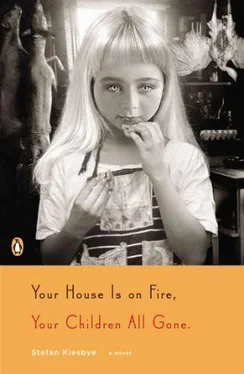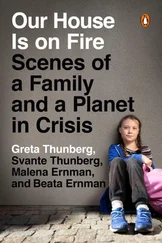“My mother stared at me with wide-open eyes. “Certainly. Yes, there’s no question.”
That night the wind turned and rattled our windows, and when I looked outside the next morning, everything was buried under a fresh blanket of snow. Our truck refused to start, and when my father finally managed to bring the engine to life, the snow fell so heavily that we had to turn around after only a kilometer or two and head back home. As if the winter wanted to make up for lost time, it snowed without interruption for four days. The blossoms on the hedges froze and broke, the tree branches burst, and finally the canals froze over and Hemmersmoor ground to a halt.
That first morning Jens Jensen, the old peat cutter, was lying drunk in a ditch, only his face and chest protruding from the snow. The children, who found him half-naked and half-frozen, threw snowballs at the slowly awakening man. “Where are my pants?” he asked in a rusty voice. “What have you done with them?”
My mother sighed in relief—for her the snow was a godsend. My father had to stay home and couldn’t see Inge Madelung anymore. And every morning she waited for the mailman, stood by the window, and couldn’t quiet her hands. When, on the third day, he finally fought his way through the snowdrifts and told her that he’d been to the manor house and delivered a thick envelope from the authorities to the widow, she hugged him. “Has to be her pension,” he said and winked at her. “They must have declared her husband dead.” After he left us, my mother stood by the window and cried for a long time.
That winter I understood very little of what was going on around me. I understood my mother’s sorrow and the fears and suspicions she harbored, but the visits from the neighbors’ wives and the mailman’s curious behavior I couldn’t explain. Something monstrous was happening under our roof, but I couldn’t make the various parts fit. Instead I wished I could have gone with Anke to Groß Ostensen. I wished we could have owned a larger house, one that looked more like the Hoffmanns’. I wished I could have seen the ghost of Friedrich’s father with my own eyes.
When, two days before Epiphany, the roads were accessible once again, I drove with my father to the manor house one final time. To my surprise Inge didn’t greet us, and when I knocked on the Madelungs’ door, everything stayed quiet. Inge had not waited for the snow to melt. The old owner came to deliver the news. “She left us,” he said. Inge had packed the same suitcase with which she had arrived in Hemmersmoor. She had wrapped Friedrich in his thick coat and left for Hamburg. “I promised her a better room, but she didn’t want to listen. God knows what got into her.”
When I told my mother, she hugged me fiercely, kissed my cheeks and forehead, and made my father’s favorite dish—pork roast with salt potatoes, carrots, and peas. Her steps were as light as a ballerina’s. And even if my father remained silent during the following days, slowly peace was restored in our house.
Only in February did the weather break, and at the beginning of March the peat cutters were once again out on the canals. My mother had feared that Inge might return, but with every new day she gained more confidence. And even my dad, who for weeks had rarely said a word at the dinner table, smiled again when I showed him my homework or what I had painted in class. Inge Madelung had found a better home. She was able to start a new life. The women in our village didn’t miss her.
It was a mild afternoon in April when we learned that Inge had never arrived in Hamburg. Peat cutters found her on their trek across the moor. The widow must have lost her way during the snowstorm, they said. Inge and Friedrich had died two kilometers from the road to Groß Ostensen. Klaus Schürholz found a letter from the Groß Ostensen authorities in Inge’s pocket. It was exactly as the mailman had said. The good news about receiving her pension, the Gendarm reported, had caused the widow’s death.
“A tragedy,” the women in Meier’s bakery called it when my mother and I went shopping after school had let out. “She wouldn’t have had to pinch every penny anymore,” Mrs. Meier said. “How foolish to walk across the moor during all that snow. A shame,” Mrs. Schürholz cried. “That old von Kamphoff should have driven her to Groß Ostensen, the old cheapskate.” My mother didn’t know what to say to all this and completely forgot what it was she had come to buy. She stammered, stuttered, looked stunned at Mrs. Meier, and swayed lightly until her friend said, “Pull yourself together.”
It was an accident. A foolish mistake. That’s what everyone in the village said. And yet, wasn’t it peculiar that my mother, who had wished nothing more than to see Inge Madelung driven from the manor, took the news of her death so badly? Wasn’t it strange that she walked home from the bakery with her face all pale and drawn and that she buried her head in her hands all afternoon and cried bitterly?
Our father was a slight man, working as a foreman for the small dairy in Hemmersmoor.
In his youth, he had dreamt of leaving his village for Australia or Canada. He’d bought illustrated books about those countries and studied the photographs with his characteristic seriousness, as though it took a straight face and an inquiring mind to leaf through their pages. He would never have relaxed that face to smile or joke about the strange uniforms the police were wearing in the pictures, not for anything in the world. It might have shattered him to hear his own laughter in Canada’s wild mountains.
Before getting married, he’d been driving a motorcycle, and he and my mother had been going to dances in the surrounding villages. A photo of them sat on a chest of drawers in the living room, and next to it was one in which my father stood in a leather jacket next to his milk-delivery van. Mr. Meier, the baker, had his right hand on my father’s shoulder, and behind them several men who looked like soldiers were unloading bread and milk. The picture was taken during the war, but my dad and the baker had stayed in Hemmersmoor. They smiled at the camera.
My father was well liked in the village and among my friends. He was charming, friendly, and the year I turned eleven and my sister’s belly swelled up was a good one for him.
By November, Nicole’s belly stuck out like a watermelon, and she wasn’t allowed to leave the house. “Who was it?” I asked her, like my mother had countless times before. Yet I didn’t shower her face with punches, I didn’t bang her head against the bedpost. My sister Ingrid had died four years ago in the fall. “And now we’re losing this one too,” my mother lamented.
I stroked Nicole’s belly, which I could barely stand to look at but had to touch nonetheless. I couldn’t keep my fingers off it. What was inside knocked against my hand, and my sister’s face grew terrified; another person possessed her like a demon. She was fifteen.
“Who was it?” I wanted to know. She had to have done it—I knew how people were made. I had watched Alex’s sister do it with an apprentice from Brümmer’s factory. It was an ugly business, brutal, and yet Alex and I had used every opportunity we’d gotten to watch through his floorboards how the young guy shook and groaned and how Anna’s flesh quivered like pudding.
My sister smiled at my questions and kept silent. My mother announced to Hemmersmoor that Nicole was sick, and kept a close eye on me. “If you don’t watch your mouth,” she promised, “you will forever regret it.” Since my sister Ingrid’s death, she had nothing but harsh words for me. My toes bled whenever she trimmed my nails, and one day in the fall she had poured boiling water onto my lap and later said the saucepan had slipped out of her grip. Whenever she caught me in Nicole’s room, she cursed at me and called my sister a whore.
Читать дальше












